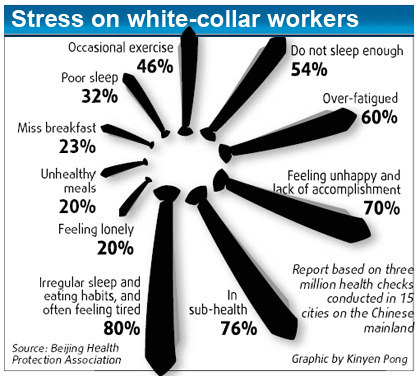Top Biz News
Property prices 'causing distress'
By Wang Zhuoqiong (China Daily)
Updated: 2009-12-08 07:55

Six out of 10 Chinese white-collar workers say they are feeling over-fatigued due to work and other pressures, a survey has found.
The No 1 cause of anxiety is the ever-increasing cost of housing and property, the survey reported.
About 76 percent of office workers are over-worked and not entirely healthy, samples from 3 million health checks in 15 cities showed.
Less than 3 percent of the respondents interviewed is completely healthy, said the White Paper on the Health of Chinese White-Collar Workers, released on Sunday by the Chinese Medical Doctor Association.
The survey interviewed people aged between 26 and 45, with monthly incomes of between 5,000 yuan ($732) to 10,000 yuan.
Many higher-income people between the ages of 35 and 50 are biologically 10 years older than their actual age, with worsening health, the survey said.
Buying property ranks as the No 1 cause of pressure for 46 percent of those interviewed, followed by parents' health, difficulty in finding a spouse, and children's education.
The increasing gap between income and housing prices is causing much stress and some 85 percent of families cannot afford to buy a house, the survey said.
| ||||
The survey said that the land supply system and developers' land stockpiles have also contributed to the out-of-reach property prices.
Commercial property prices have gone up 5 to 10 percent, with a square meter costing between 4,935 to 5,280 yuan.
From January to August this year, developers have invested 2,111 billion yuan in property, up 14.7 percent year-on-year.
Revenue of commercial property is 2,346.3 billion yuan, up 69.9 percent year-on-year.
The moans over property prices are the talk of the town, reaching a peak this year as the Chinese television drama, Dwelling Narrowness, became a hit with many viewers across the country.
The 35-episode series has touched the nerves of city dwellers who find empathy with the characters in the drama, according to media reports.
Caught in a debate between reality and morality, the audience could not help but connect with the pains and pressures caused by the cost of living in the city, television analysts have said.
Most young college graduates and migrant workers who settle into jobs in big cities prefer to buy an apartment rather than rent, according to media reports.
But rising housing prices make an apartment a difficult dream.
The ownership leaves a burden that costs their parents' their entire savings or results in decades of mortgage loans.
Wang Ke, a purchasing manager with a monthly salary of 10,000 yuan, had to borrow money from her grandmother for the downpayment for her apartment.
With a monthly mortgage of 4,000 yuan, Wang said saving money is now virtually impossible.
"Housing prices are going up each day, though my salary stays still," she said.













